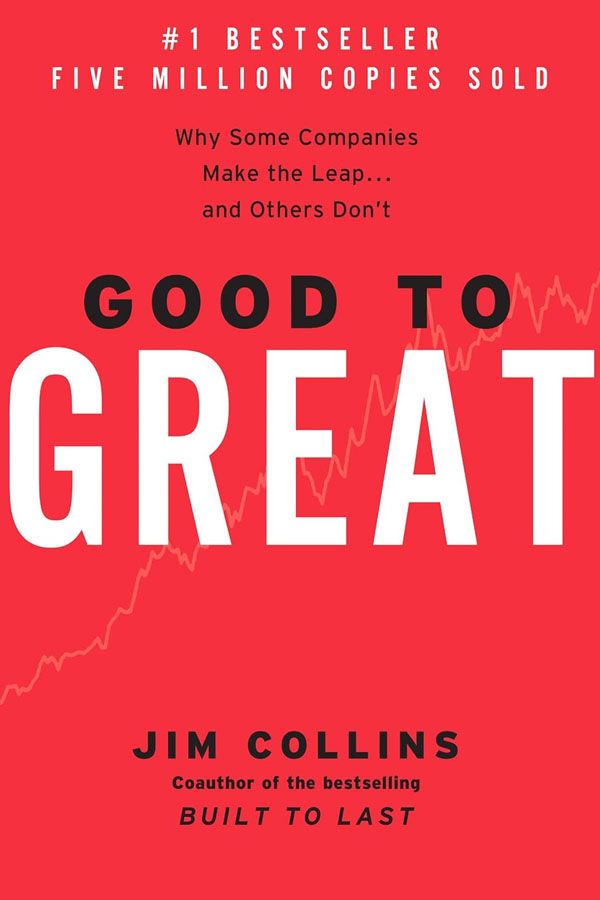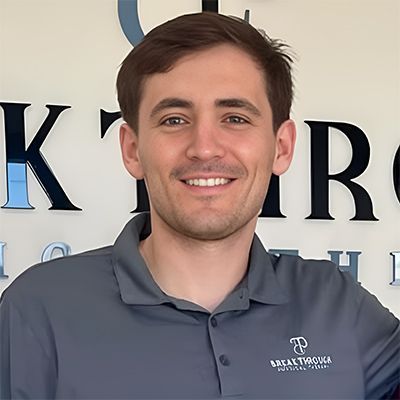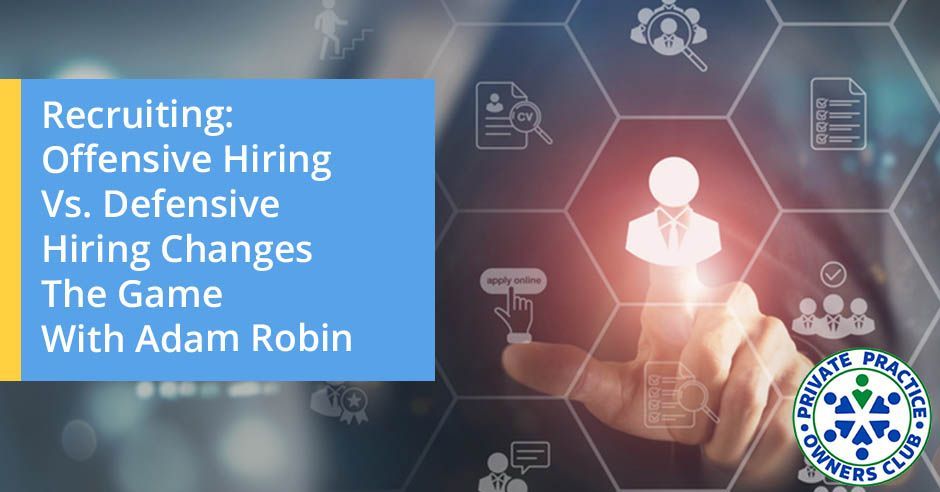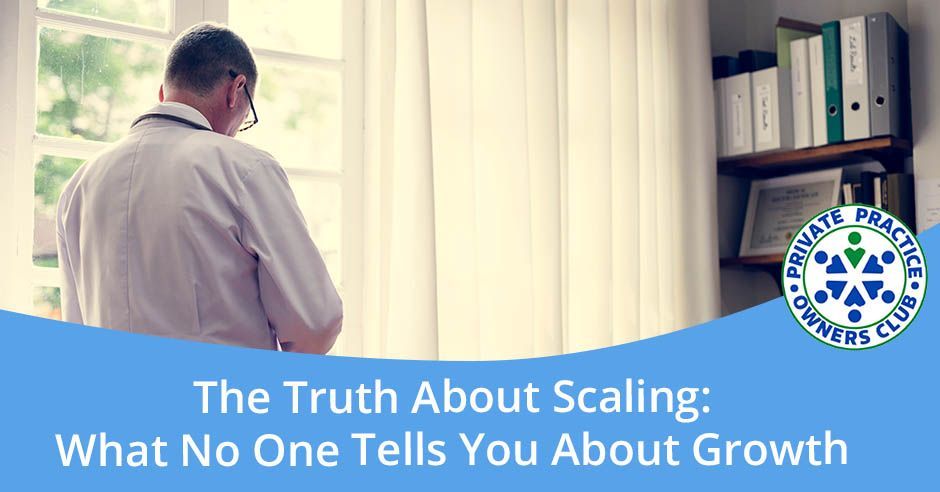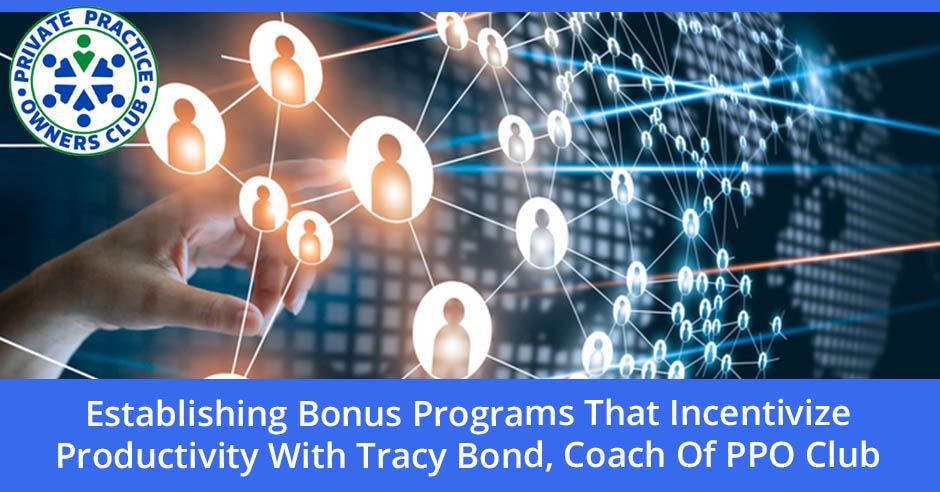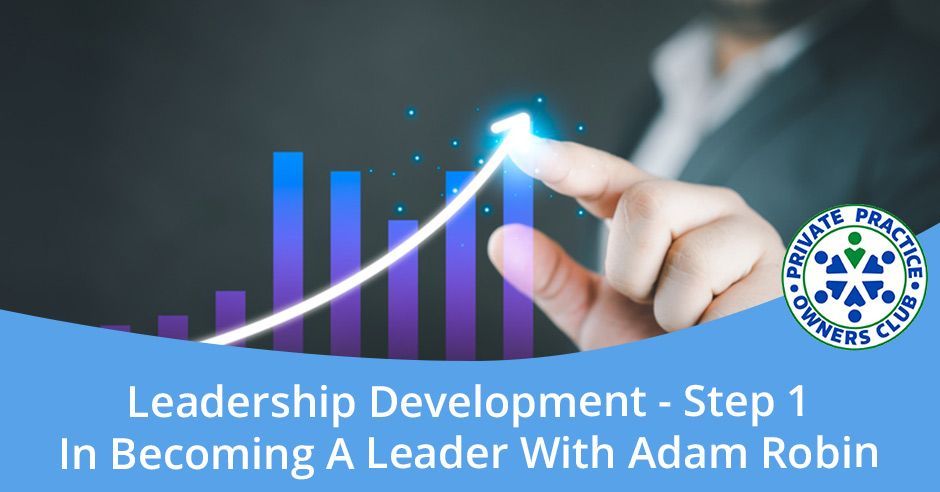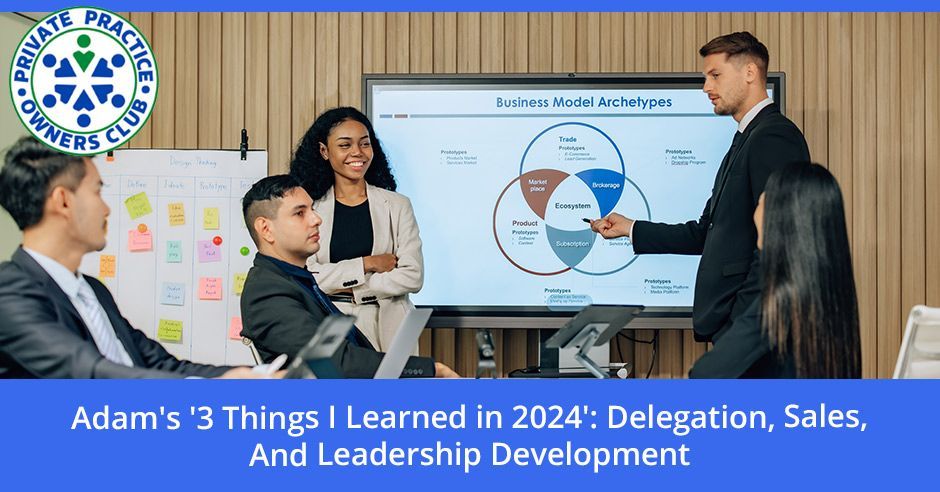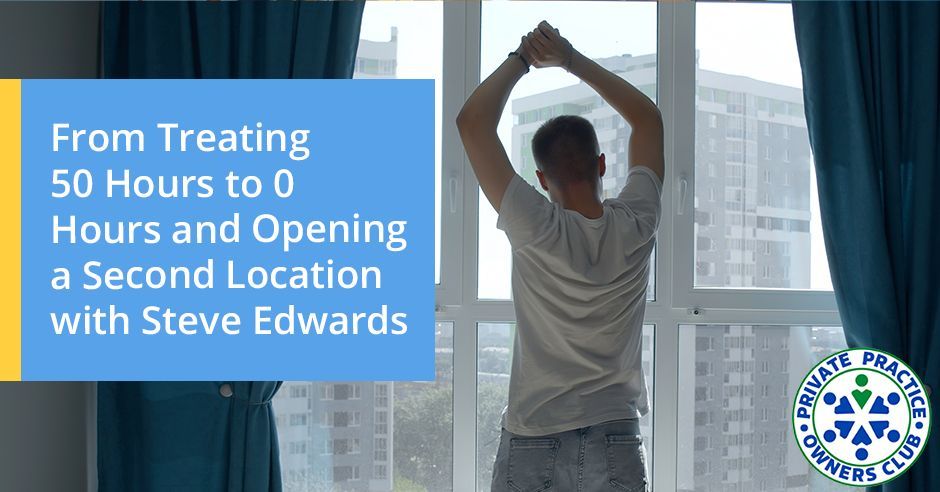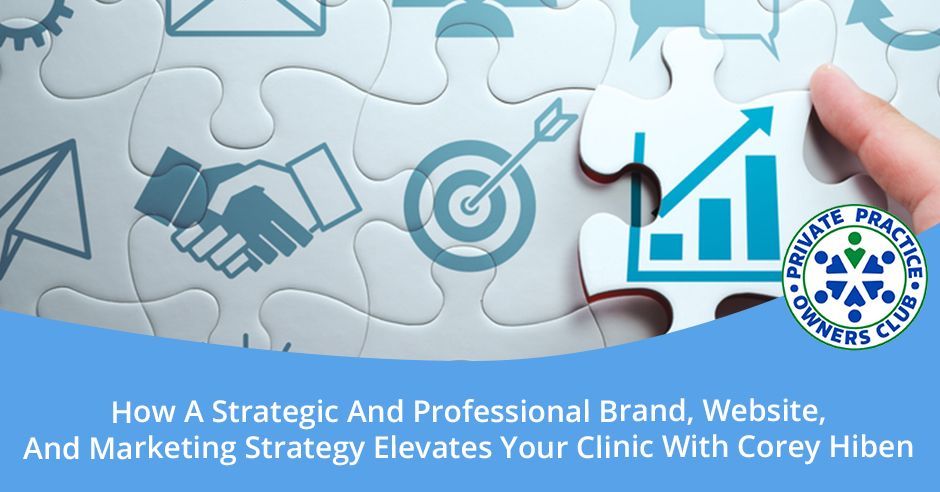What if you can scale your Private Practice to over 200 weekly visits in just a year? Learn from
Zack Randolph, owner of
Breakthrough Physical Therapy. He built a thriving Practice with a small team and a big vision.
In this episode of the Private Practice Owners Club podcast, Adam Robin welcomes Zack Randolph, a Private Practice owner who achieved explosive in his first year of operating. Zach shares his journey of scaling a Private Practice to deliver outstanding care while building a standout workplace.
Episode Highlights:
1. How Zack scaled from a startup to 200+ weekly visits.
2. Why naming your Private Practice matters and how it reflects your vision.
3. Practical tips on empowering your team to lead and grow with you.
Don't miss this episode of the Private Practice Owners Club Podcast – whether you're just starting out or looking to expand, this podcast will change how you approach your Practice and achieve success.
Visit our Linktree for our Coaching Services, Free KPI Dashboard, Facebook Group, and Annual Strategic Planning Services: https://go.ppoclub.com/linktree-podcasts
Love the show? Subscribe, rate, review, and share!
https://ppoclub.com/
---
Listen to the podcast here
0 - 200+ Visits Per Week In Less Than 12 Months With Zack Randolph Of Breakthrough Physical Therapy
We have a rockstar client. His name is Zack Randolph. Zack is the owner of Breakthrough Physical Therapy in Amory, Mississippi. I wanted to bring him on because the dude's been killing it. He's been working with me for about a year now, and he's doing something special. I thought it would be cool to bring him on and tell his story. What's up, Zack? How are you?
What's up? How are you doing?
How Zack Randolph Started His Practice
Zack, I am so impressed by what you are doing. I'm jealous. You have been doing so well. We have known each other since before you opened your practice, and it's like when you opened, you hit the ground running, and your clinic exploded. I want you to introduce yourself, tell people who you are, and maybe we can talk a little bit about how you got out of school, what you did, and what led you up to opening your practice. Then we can take it from there.
We started as an adult outpatient physical therapy clinic in Amory, which is a smaller town in a bigger county, a little bit more rural area. Like most therapists, I had some injuries and was introduced to physical therapy in high school, and there was a guy in my hometown who was like that guy. Then again, in college, I got hurt again. It was time to decide what I wanted to do. I talked to him, and he pushed me toward physical therapy, which was an awesome choice. I was going to go to PT school, come back, and work for him. Unfortunately, after my first year of PT school, he passed away. He had cancer, so he was a big motivator for me because he was the guy that you could lean on. Growing up, I didn’t know there were other clinics. It was that guy you called if you got hurt.
He encouraged me to go to physical therapy school. I got out of physical therapy school and like most people, did corporate PT-type therapy. I always had that entrepreneurial bug and wanted a little bit more. Similar to you, I didn’t want to go straight into my own thing. I needed about a year or two so I did some home health in between, trying to get some time and money and things like that. I opened in October of 2023, just me and an office manager.
We added on and started pediatrics. We’ve got fifteen employees now. I’m enjoying it. With Adam, I reached out because I’ve read every episode of this show ever. During those home health days, I went back and read every episode. I’d read 10 in 1 day. In one of the episodes, you were talking about reaching out to somebody doing what you want to do. I called you, found you through somebody from PT school, and they told me about you in South Mississippi. I called you, told you everything, and said I had been reading this show. You said, "What episode are you on?" I told you, and you said, "Mine’s coming up in a few weeks," so I hadn’t gotten there yet. I read your show, and then we hit it off. We’ve been talking for several years now.
I love how you said ten episodes in a day. That’s a lot. That’s a lot. For those reading, that’s the type of intensity this guy brings to his work. It’s super awesome to see that because it inspires me. You don’t play around. When you get locked in on something, it’s like you’re in there. I remember because I was doing home health as well. When you called me, I still had the clinic, and I was doing home health on the side. I remember having those phone calls with you, sitting in patients' driveways, talking about business and what you wanted to do. It came full circle. Then you opened your clinic and you named it Breakthrough Physical Therapy. Why Breakthrough?
That was another thing. There are so many episodes on that show. I read a guy’s episode. Nothing against anybody who names it after themselves. That’s probably what I would have done too but he talked about how he named it Randolph Physical Therapy, or whatever his last name was. He shifted towards, "This isn’t about me. This is about having a lot of therapists who can deliver the same thing I can do," more of like a team aspect.
I tried to proactively not name it after myself because I had this vision for a ton of therapists working here, all of us doing the same thing. I mulled over some ideas, and it was like a Christian song at church one day. It was so about breakthroughs, and I pictured, whether it be personal therapy or whatever, going through something. It’s cliché, but it’s like a breakthrough mentally, physically, or whatever. We are big on relationships, so breaking through any barriers we have, that’s why we named it that.
Biggest Lessons From Private Practice
Will Humphreys come to mind? I talk about Will a lot. He's big on naming things. He's very big on being careful and intentional about how you name things because they set the tone. The language you use to describe things plays a big role in your culture and whatnot. That's amazing. We started working together before you opened your practice. What are some of the things that you've learned through, let's say, the first year of your business? What are some of the big lessons you've learned so far?
One of the biggest things I learned, because everybody who comes on that's why I enjoy this so much is, let's say somebody that comes on and they are in a different season of life. They’ve had a clinic for 20 years or 1 year or whatever. For each person that comes on, I’ve been able to pull this little tidbit of information from them. Some of them, I’ve got notes on my phone with everything they say. I'm eating it up, you know what I'm saying?
One thing I noticed, almost all of the people who had been on the show said, "I went through 3, 5, or 10 years of burnout, and then I got coaching, or then I got a mentor. I wish I'd done that sooner." You talked about trying to be proactive. If you hear 25 owners say, "I should have done this earlier," we talked about it. I was like, I feel like it may be too soon to do some coaching or mentorship. Looking back, I don't think you can do it soon enough.
Our goal was to be super proactive in every aspect. Instead of going back and putting out fires, we tried to do it the right way from the start. Even with that being our goal of being super proactive there are still a ton of fires to put out. I can't imagine not having a good network of people to call from the very beginning. I could see how it got out of hand very fast.
Be super proactive in every aspect of your business. Instead of going back and putting out fires, try to do right from the start.
You've been killing it. You are killing the game. We are going to put some numbers together. How many visits a week are you guys doing right now?
It goes up and down. I would say right now, probably between 200 to 240 weekly visits.
Biggest Challenges As A Business Owner
That's incredible. I got into coaching pretty early. It took me maybe about a year and a half or two years before I got into coaching. I was at 120 visits a week or something. To hear that you are there, and next year you are set up to do so much more, it's pretty incredible. The one thing, going back to your superpower, which is the intensity that you bring to work, you and I are wired in a similar way there. When you see something that you want, you are getting it done. It doesn't matter how much time it's going to take. It doesn't matter how hard it's going to be. You are going to lean in and get it done. That’s your superpower, but it also comes with some weaknesses and some blind spots. Talk to me about some of the challenges that you've had. Even with all the growth, what are some of the challenges you've had as an owner?
Talking about the visit count and all those things it doesn’t have anything to do with me. It’s a part of mentorship and coaching. Learning from all these guys talking about who to hire, and why to hire. These therapists, they come and now people would do a whole plan of care and leave saying, "Thanks so much, Zack," and I haven’t treated them one time. That’s fun for me to see these other therapists. I pushed them to do their own thing and to be able to help more people because they were doing so good.
When I see something that I want, it's good. When we hired our pediatric director, I told her one day, "I'm obsessed with this." I said, "I’ll be calling you on the weekend." She said, "It’s okay." I’m like, "No, I’m not kidding.” I’m at church and we are doing worship songs, and halfway through the song, I start thinking about the clinic. I was like, "I’ve got to stop doing this."
That is one reason why we’ve been able to help so many people so far. At the same time, a little bit of it is doing everything I can control being super intense about it and then trusting the process. Let’s say you have a bad week of referrals. There’s a part of me that’s like, "I’ve got to jump in here and fix this." Versus, we are doing everything the right way, and it’s going to work itself out. Having to lean into trusting the whole team versus one thing going wrong and thinking, "I’ve got to go market. I’ve got to do these things."
It’s a good thing, but it’s also a curse if you let it be. Usually, our strengths end up being the bottleneck on the back end. Recognizing what’s going to be the bottleneck beforehand talking to the therapists, talking to you, talking to some mentors and being proactive with it, and being clear about how to fix it versus getting stuck in this 3 to 4 months bottleneck whether it’s getting referrals, having hard conversations with employees, or anything like that.
Valuable Strategies In Managing A Team
I feel like you’ve gotten a decade's worth of experience in a matter of twelve months. You’ve opened a clinic, marketed, developed policy and procedure, built a leadership team, expanded your building, hired people, and figured out billing. It’s like every week like another year has gone by. That’s hard and stressful because you’ve got a great team, you’re in a coaching program, but you’re still inserting yourself into unfamiliar territory. You have to trust the process a lot. Through that, you’re moving so quickly and getting into that problem-solution, problem-solution rhythm. You’re solving problems all day. As you get bigger, how many employees do you have now?
Fifteen, probably.
We are fifteen employees, but with that much intensity, sometimes we forget to pop our heads up and be like, “What's coming up next month? What's coming up next quarter?” It’s because the vision has to get a little bit further out as you get a little bit bigger, and that's what I'm excited about for you. It's like you've got all of the things in place, all of the basics. There are always going to be things you can improve in your business, and next year it's about like, “How do we get Zack to be able to see the vision and be able to get super far in front of the team?” I feel like that's going to be the thing that sets you free.
What has helped us the most is we all are on the same page and working together, it's hard for me because I feel like I have to jump in and do some things, but we have such good therapists, billers, and front office staff, and they are so much better than me at certain things. It took a little bit. This is what I envisioned getting them to see the same vision as I do. One thing that we did that helped a lot is instead of me doing coaching, me watching YouTube, me doing podcasts, whatever, and then trying to relay the message, and it's coming out from Zack, we sat around and read a couple of chapters of
Traction.
You cannot perform well as a business leader if everybody in your team is not communicating and being clear.
It starts with you being clear. There are a few things that you hit on there. Number one and I'm probably going to forget them all but you mentioned this idea of reading books together, and I get that because I can remember being in a place where I felt like I had to tell my people what to do. It became this conflict of like, Adam versus this person. It was like Adam versus Zack.
What reading books, listening to podcasts, or leveraging external resources like a coach does, is it creates it’s no longer me versus you. It's us looking at the resource, and so we are both looking in the same direction. That creates what's called an area of common ground and that's one of the principles in that book, Crucial Conversations, and when you can create that area of common ground, and let's say, "We might think differently, but let's follow the same principles. You do it your way, I will do it my way, but we are going to all end up in the same direction.” That's a good fundamental way to lead your team.
I do brag on them as much as possible because it does not hinge on me at all. It's because of how good they do. Our patient care coordinators used to be teachers. She’s super organized. I am not super organized, and it doesn't matter. If I'm clear enough on what we need to be successful, she's going to get it done. If you can have a couple of killers like that on your team, it doesn't matter what the obstacle is. You ask somebody for some help, you get clear on what the problem is, we talk about it, and from then on, it's done.
There are a couple of people on the team so far that have bought in all the way, and that's the only way you can have, in my opinion, this amount of patients in this short amount of time is relying on others and them stepping up. We are blessed so far that everybody's on the same page. All of us have worked in other places, and it's easy for me to pull things that you liked or didn't like from past experiences or past jobs and be like, "This is what we want to do here, and this is how we are going to do it." They just step up every time.
How much marketing have you guys done?
We are pretty active on Facebook, and other than that, we have good relationships with some providers. It's like a bad thing. Let's say we get low when we come, like, “We got to go to doctor's offices and take them donuts.” I'd end up not doing it next week. We always said, “Record for this week,” or whatever. We are leaning into let's serve these patients right, treat them right, and we are doing it from a place of, if I was getting therapy, what would I expect? They go tell their family members and anybody. You go eat a good meal, and the next day, you are going to tell everybody how good it is. You treat people the right way, they are going to go market for you. We don't do a ton of external marketing.
That's what I wanted to get to. It's like a powerful thing happens when you get the entire team rowing the boat in the same direction, and it's unexplainable until you experience it. We are so used to scrolling TikTok and seeing the click now. We think that that's the easy thing to do to generate patients. Everybody wants to market and get new patients, but the most valuable asset that, in my opinion, and it's, it's that opinion is becoming more and more apparent to me as I grow in my leadership and my ability to align my team. When I say align my team, create an environment where people can be successful. That's it. That's the key.
The other thing that you've been hitting on, but I want to acknowledge it, is your ability to ask for help. Your ability to get to asking people for help quickly, because people do not build trust when you give them help. They build trust when you ask for help. If I'm running around saying, “Zack, Do you need me? Can I help you? How can I help you? I can help you. Zack, Let me help you.”
At some point, you are going to be like, “Adam, can you back off? You are aggravating me.” However, if I come up to you and I'm like, “Zack, I'm having a hard time, and I could use your help on this.” You feel like you are instantly drawn in because my guard is down and you are able to come in and connect with me because I'm being vulnerable with you.
Not everybody's good at that, and I don't think that I'm as good at that as you are. We have a hard time asking for help as owners because we feel like we have to have all the answers. We feel that this is our problem to solve. I get on calls with owners and even clients in our program, and they are like, “I'm struggling. Clinic A's doing good, but Clinic B is having a hard time with X, Y, and Z.” I'm like, “How many people on your team know that?” “None.” It's like, “What a great opportunity for you to be open and vulnerable with your team. You can build so much trust there if you get help. Ask for help and they will help you.
Something happened and I was smiling so big. I'm like, “This is great.” It’s something about discharge notes or something. It was me and one of our therapists, and our billing manager, and we were trying to get some DCs done. It happened and she deleted some visits going forward. We looked at it, and we were doing it wrong. We didn't know how to do it. We figured out how to do it. My first thought is like, “We need to create a system for that. We didn't know what we were doing.” I said, “Do you know what we need to do?” As I was saying it, she had drawn a star on the sheet of paper at the bottom, and she was writing it out already. She was like, “I know.”
The reason they are so good at it now is like you said. We haven't talked about it yet, but during those 1 to 2 years of home health, I had to change a lot. My personality is the way I try to serve people versus looking for what you can do for me. The two that I have known the longest, they told me. They said, “You are not the same person you were a couple of years ago when we have worked together in the past.” I was like, “What do you mean?” They are like, “We mean in a good way. We have talked about this before.”
It was like a very good compliment to me, and they were like, “You weren't a bad person. You are just different now.” I did need those couple of years of home health, got closer to the Lord, read books, listened, talked to people, and it did create this big mind shift for me that was like, you don't have to have it all figured out. You are going to have to rely on people.
That's how we have gone about all of the systems, all of the processes, creating manuals, doing all these things is you are good at organizing and you are better at this than I am. I'm not 100% sure how to do this. We are creating all this from scratch. When we run into an issue, let's capture it. Let's not sit in this dark room, and create all these systems. When we run into a problem, let's create a system for it going forward. We'll be so clear that each time we hire somebody onboard, it gets better. At first, it was terrible. It was just, “Thank God you are here. We got too many patients.”
Being able to say, “I'm not 100% sure how this is going to look, but I need you to help me with it. I'm not 100% sure what your job description is going to be like, but you are going to help me do it because you are better at these skills than I am,” has been huge. Then it's not, “I know everything. This is how you are going to do it.” It's, “I need your skills and we are going to create it together.” It has been more beneficial like that than me sitting in a room creating all these systems and trying to spit them out at everybody.
There's a book called
Ready, Fire, Aim, and it's similar to that principle. It's a book around sales, but that whole principle. It's like people think it's "Ready, aim, fire," but it's like, "Ready, fire," and then if you miss, then you pivot, then you aim. It's like getting into action way quicker, because by the time you've written out your policy and procedure manual, Zack has already gotten 150 reps in, edited his policy 4 times, and got it super dialed in. He is on the next thing. You're getting more reps. That's awesome.
Two nuggets that I took away from that. Number one, super cool to hear that your team is starting to recognize the power of capturing processes. Stage one is leading yourself, and it sounds like you learned how to do that through the personal growth and development that you did in that car riding around in home health. I want to acknowledge you. That is super awesome. That self-discovery experience is one that is vital and unique to every owner and I have a very similar experience.
Number two is leading others. Step two is leading others and helping people on your team, empowering them to help you, and helping them turn into superstars. Already got it written down. You check. Step three is, “How do I get them to build other leaders?” A great thing for you to start looking at in 2025 is when you start recognizing those types of behaviors in others. It's like, “I already got it written down.” It's like, "How'd you do that?" Help her capture that, and then it's like, "Do you think you could teach other people to do that? Can you run that by the whole front office and teach them that?" Now you are helping her spread her genius into the organization. That extra little layer is powerful.
The other thing I was going to tell you about is the personal growth piece, in the beginning, we built the business. I know you are a Dan Markel fan, but at the beginning, you build the business, and then eventually you build the people, and they build the business. I have had the same people tell me that too. "You are not the same person that I started working for back in 2019. You are a completely different human being." That is exactly what you want to hear from people because that means you are getting better, and that's exactly what I want to see in my team.
Zack’s Plans And Visions For 2025
If I have people on my leadership team, it's like, “I don't want to be having the same conversation with you in six months. I need you to look different. I need you to dress differently. I need you to present differently. I need you to be more bold. I need you to be more confident. I want to feel like I'm talking to a different person. If I start seeing stagnation amongst my team, that's a good indication that you need to lean in and be like, "What are you guys working on? What books are you reading?” It’s because everybody around us is growing, and if you don't grow, you might get left behind. It's another thing to keep an eye on as you start building leaders on your team. Tell me about your vision for next year. What's 2025 going to look like? I know you might not be crystal clear on it yet, but what are some of the things that would excite you going into next year?
We had our ribbon cutting for the pediatrics. It was exciting. Families, local government, all came, and that's what, the mayor talked for a second. He was like, "Zack, tell me a little bit about what's going on here," and I told him, "Our goal is to have the best adult physical therapy clinic and the best pediatric clinic. If you are in this area and the word 'therapy' comes up, I have to go there. There is no reason I wouldn't go there. I know who's there. I know that they care and treat us."
This first year has been like holding on. Getting super clear going forward on being proactive with onboarding, right now, we are doing some annual reviews, and we are retroactively getting clear on some stuff. I'm saying, we didn't know what was going on at the beginning. You hire somebody 2 months in, you hire somebody 5 months in, and you are making it up as you go. 12 to 15 times later, you are super clear. This entire year is getting so clear on everybody's purpose, everybody's job description, who does what, how do we do it, to where by the end of 2025, there's not one question mark.
We are going to grow this 2025, and for me, it would be that we are so much more clear in December 2025 than in 2024. There is not one leaf unturned. We know what's going on. Everybody's still rowing in the right direction. Hire some more PTs and pediatric staff and things like that. That's my vision for next year 2025.
There's one book that comes to mind, and it's probably one that you've read, but it may be worth rereading sometime over the Christmas break,
Good to Great. Recognizing like, “You are good, but how can we be great? That could be a great book for you and your team to read together.
In that book, he differentiates levels 3, 4, and 5. It's like these new levels, and level 4 is great, if I remember correctly, and then level 5. You are out there doing it. That's one I read during those two years of self-discovery, and I enjoyed it. It’s like Dan Markel talks about, he's like, quit reading books if it's not what you are going on with right now. It's a good little primer, but now you are in the thick of it. It's like, “Let's go back and reread it. I bet you highlight a few more things that you are going through.
We have leaned into that a little more because we have separated adults and pediatrics, and there has to be some mediation between the two. We have a clinic director, and she is one of those rockstar therapists and leaders. One thing that helped me and any clinic owners who are newly opened, looking to open, or five years in is how organized. I don't think time matters as much as how organized you are.
One thing that helped me a ton was I was stuck doing the treating all day, every day. Let's say somebody doesn't show up, “We'll slide Zack's patient over to another therapist so he can have one hour to try to do taxes, leadership stuff, or a little bit of this and that.” It's like a buffer zone where you don't get anything done in that hour because you're stuck in treatment.
You go for an hour, stop and talk to somebody, and then get five minutes of work done. Block off at least half a day, two days a week, to meet with therapists and your biller, and have several hours back-to-back where you are doing that same thought process. It was about the same amount of time that I had to do that type of stuff when I was sliding and doing those types of things.
When you are focused on how that's planned like we hired a patient care coordinator for the pediatric side and an OT. It was her first day, and we had a super busy day on the adult side. At the end of the day, I wanted to check on her because she's an awesome girl. Sweet. She's going to do awesome. I didn't get to talk to her much, but the week before, we had already talked in our meeting about some things we wanted to go over on her first day.
At the end of the day, I can trust the pediatric director. I checked on her and asked, "How was your first day?" She said, "I learned so much. We went through notes and this checklist we talked about." It's so much better doing it like that than winging it and being like, “Yeah. I treated eight people today.” It is fun watching her, the other therapists, patient care coordinators, billers, and office managers.
It's addicting seeing them lead people, being able to trust them, and them doing it. You're like, “That OT had a great first day, and I didn't get to talk to her.” The director of pediatrics did a better job at it than I could. I don't need to stick my nose in there. It was rewarding seeing those things.
Getting In Touch And Closing Words
What you are doing is inspiring. I know whenever I did my show with Nathan several years ago, I had 3 or 4 people. You are one of those who reached out to me. If somebody wants to connect with you, listen to your story, or pick your brain, would that be okay?
Yeah.
What would be the best way to get in touch with you?
I'm pretty active on Facebook, and I answer all those. It's
Zack Randolph
or my
Email.
Zack is an intense dude, a baseball player, and knows how to compete. If anybody reading is inspired by his story, give Zack a shout. He can point you in the right direction. I appreciate it.
Last thing. Any clinic owner, if you have any employees, let's say things aren't going good, numbers are low, or whatever, the one thing I try to lean into is, “Who and how can I serve now?” Every time anything goes wrong, we’re going to do good. If I flip that switch back to, "Who can I serve, and how can I do it now?" It always comes back around.
I talked to another coaching client and asked him some questions. I told him, "At the end of the day, go serve." We got off the phone and it was lunch. I said, "Go now. I want you to tell me how it goes. Go serve your front desk as best as you can and let me know how it goes." That's how I look at it. You do it from a place of a servant's heart not trying to get something back but it will come back around to you.
Do your job from a place of a servant's heart not trying to get something back. It will come back around to you.
Just be you. Let's plan on doing another episode next time and we'll see where you're at.
I'm looking forward to it. I appreciate you.
Peace out.
Important Links
Important Links






